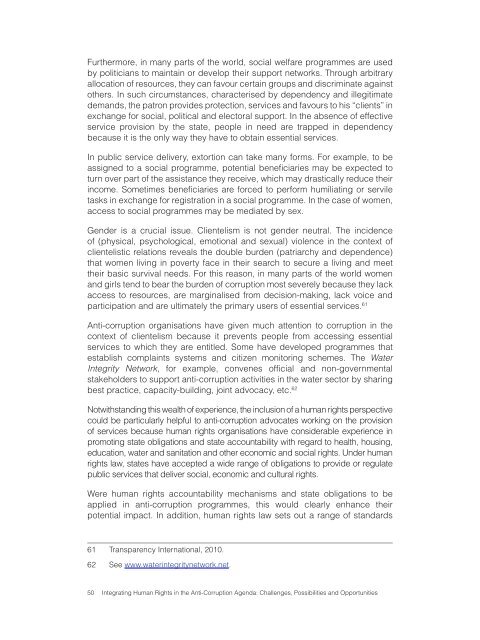Integrating Human Rights in the Anti-Corruption Agenda - The ICHRP
Integrating Human Rights in the Anti-Corruption Agenda - The ICHRP
Integrating Human Rights in the Anti-Corruption Agenda - The ICHRP
You also want an ePaper? Increase the reach of your titles
YUMPU automatically turns print PDFs into web optimized ePapers that Google loves.
Fur<strong>the</strong>rmore, <strong>in</strong> many parts of <strong>the</strong> world, social welfare programmes are used<br />
by politicians to ma<strong>in</strong>ta<strong>in</strong> or develop <strong>the</strong>ir support networks. Through arbitrary<br />
allocation of resources, <strong>the</strong>y can favour certa<strong>in</strong> groups and discrim<strong>in</strong>ate aga<strong>in</strong>st<br />
o<strong>the</strong>rs. In such circumstances, characterised by dependency and illegitimate<br />
demands, <strong>the</strong> patron provides protection, services and favours to his “clients” <strong>in</strong><br />
exchange for social, political and electoral support. In <strong>the</strong> absence of effective<br />
service provision by <strong>the</strong> state, people <strong>in</strong> need are trapped <strong>in</strong> dependency<br />
because it is <strong>the</strong> only way <strong>the</strong>y have to obta<strong>in</strong> essential services.<br />
In public service delivery, extortion can take many forms. For example, to be<br />
assigned to a social programme, potential beneficiaries may be expected to<br />
turn over part of <strong>the</strong> assistance <strong>the</strong>y receive, which may drastically reduce <strong>the</strong>ir<br />
<strong>in</strong>come. Sometimes beneficiaries are forced to perform humiliat<strong>in</strong>g or servile<br />
tasks <strong>in</strong> exchange for registration <strong>in</strong> a social programme. In <strong>the</strong> case of women,<br />
access to social programmes may be mediated by sex.<br />
Gender is a crucial issue. Clientelism is not gender neutral. <strong>The</strong> <strong>in</strong>cidence<br />
of (physical, psychological, emotional and sexual) violence <strong>in</strong> <strong>the</strong> context of<br />
clientelistic relations reveals <strong>the</strong> double burden (patriarchy and dependence)<br />
that women liv<strong>in</strong>g <strong>in</strong> poverty face <strong>in</strong> <strong>the</strong>ir search to secure a liv<strong>in</strong>g and meet<br />
<strong>the</strong>ir basic survival needs. For this reason, <strong>in</strong> many parts of <strong>the</strong> world women<br />
and girls tend to bear <strong>the</strong> burden of corruption most severely because <strong>the</strong>y lack<br />
access to resources, are marg<strong>in</strong>alised from decision-mak<strong>in</strong>g, lack voice and<br />
participation and are ultimately <strong>the</strong> primary users of essential services. 61<br />
<strong>Anti</strong>-corruption organisations have given much attention to corruption <strong>in</strong> <strong>the</strong><br />
context of clientelism because it prevents people from access<strong>in</strong>g essential<br />
services to which <strong>the</strong>y are entitled. Some have developed programmes that<br />
establish compla<strong>in</strong>ts systems and citizen monitor<strong>in</strong>g schemes. <strong>The</strong> Water<br />
Integrity Network, for example, convenes official and non-governmental<br />
stakeholders to support anti-corruption activities <strong>in</strong> <strong>the</strong> water sector by shar<strong>in</strong>g<br />
best practice, capacity-build<strong>in</strong>g, jo<strong>in</strong>t advocacy, etc. 62<br />
Notwithstand<strong>in</strong>g this wealth of experience, <strong>the</strong> <strong>in</strong>clusion of a human rights perspective<br />
could be particularly helpful to anti-corruption advocates work<strong>in</strong>g on <strong>the</strong> provision<br />
of services because human rights organisations have considerable experience <strong>in</strong><br />
promot<strong>in</strong>g state obligations and state accountability with regard to health, hous<strong>in</strong>g,<br />
education, water and sanitation and o<strong>the</strong>r economic and social rights. Under human<br />
rights law, states have accepted a wide range of obligations to provide or regulate<br />
public services that deliver social, economic and cultural rights.<br />
Were human rights accountability mechanisms and state obligations to be<br />
applied <strong>in</strong> anti-corruption programmes, this would clearly enhance <strong>the</strong>ir<br />
potential impact. In addition, human rights law sets out a range of standards<br />
61 Transparency International, 2010.<br />
62 See www.water<strong>in</strong>tegritynetwork.net.<br />
50 <strong>Integrat<strong>in</strong>g</strong> <strong>Human</strong> <strong>Rights</strong> <strong>in</strong> <strong>the</strong> <strong>Anti</strong>-<strong>Corruption</strong> <strong>Agenda</strong>: Challenges, Possibilities and Opportunities

















